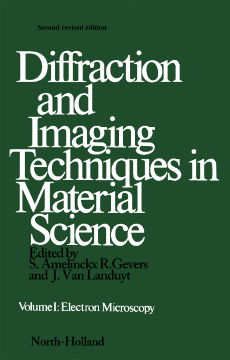
Additional Information
Book Details
Abstract
Diffraction and Imaging Techniques in Material Science describes the various methods used to study the atomic structure of matter at an atomic scale based on the interaction between matter and radiation. It classifies the possible methods of observation by making a list of radiations on the basis of wavelength, including ions, X-ray photons, neutrons, and electrons. It also discusses transmission electron microscopy, the weak-beam method of electron microscopy, and some applications of transmission electron microscopy to phase transitions.
Organized into 13 chapters, this volume begins with an overview of the kinematic theory of electron diffraction and the ways to treat diffraction by a deformed crystal. It discusses the dynamical theory of diffraction of fast electrons, the treatment of absorption in the dynamical theory of electron diffraction, the use of electron microscopy to study planar interfaces, and analysis of weak-beam images. The book also covers the use of computed electron micrographs in defect identification, crystallographic analysis of dislocation loops containing shear components, and detection and identification of small coherent particles. In addition, the reader is introduced to interpretation of diffuse scattering and short-range order, along with the crystallography of martensitic transformations. The remaining chapters focus on the working principle of the transmission electron microscope, experimental structure imaging of crystals, and the study of diffuse scattering effects originating from substitutional disorder and displacement disorder.
The information on diffraction and imaging techniques in material science contained in this book will be helpful to students, researchers, and scientists.
